There’s not enough Dramamine in the world for this emotional roller-coaster.
bro
brō/
noun/informal
1.
short for brother.
“his baby bro”
2.
Suwa
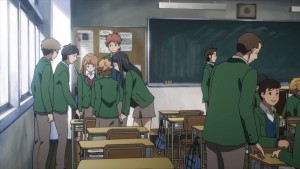 Orange is really taking years off my life. It doesn’t help when the heroine drops the BIGGEST TRAGEDY FLAG EVER right at the beginning of the episode. What, Naho, you couldn’t even wait for the credits? “Bright future” my ass… There is a kind of opposite syndrome at work with this show, where the surface mood seems to contradict the actual state of events in the story. It’s always darkest before the dawn and all that – but with Orange I feel like the light at the end of the tunnel is- Well, you get the point.
Orange is really taking years off my life. It doesn’t help when the heroine drops the BIGGEST TRAGEDY FLAG EVER right at the beginning of the episode. What, Naho, you couldn’t even wait for the credits? “Bright future” my ass… There is a kind of opposite syndrome at work with this show, where the surface mood seems to contradict the actual state of events in the story. It’s always darkest before the dawn and all that – but with Orange I feel like the light at the end of the tunnel is- Well, you get the point.
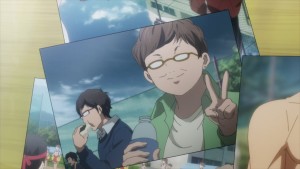 When you step back and look at this series as a whole, certain things become clear. There are directions that mangaka Takano Ichigo has been moving in from the very beginning that weren’t always obvious in real-time. Suwa’s role in the drama has changes more than anyone else over the past eleven episodes, to the point where I would argue that he’s actually the co-protagonist of the story. Kakeru is certainly central, and his fate still weighs most heavy on me as a viewer, but Suwa is no third wheel here. One could almost say that Kakeru is the main character, Naho is the heroine and Hiroto is the protagonist.
When you step back and look at this series as a whole, certain things become clear. There are directions that mangaka Takano Ichigo has been moving in from the very beginning that weren’t always obvious in real-time. Suwa’s role in the drama has changes more than anyone else over the past eleven episodes, to the point where I would argue that he’s actually the co-protagonist of the story. Kakeru is certainly central, and his fate still weighs most heavy on me as a viewer, but Suwa is no third wheel here. One could almost say that Kakeru is the main character, Naho is the heroine and Hiroto is the protagonist.
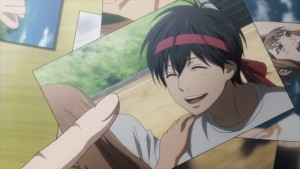 Suwa’s feelings for Naho have always been the elephant in the room with Orange, and even once they were acknowledged by the characters that more or less remained true. I think the reason is understandable – it’s a very uncomfortable topic for any of the kids to talk about (most of all Hiroto himself). When you really step back and consider what Hiroto-kun is trying to do at Suwa-san’s urging, it’s pretty staggering. If he succeeds, he’ll never know the happiness his parallel self knows. It’s nice for Suwa-san to try and dictate Hiroto’s life from a safe distance, but his future with Naho is secure. He’s asking his younger self to give up everything to try and assuage the guilt he feels over having betrayed Kakeru. Talk about presumption – that pretty much defines it.
Suwa’s feelings for Naho have always been the elephant in the room with Orange, and even once they were acknowledged by the characters that more or less remained true. I think the reason is understandable – it’s a very uncomfortable topic for any of the kids to talk about (most of all Hiroto himself). When you really step back and consider what Hiroto-kun is trying to do at Suwa-san’s urging, it’s pretty staggering. If he succeeds, he’ll never know the happiness his parallel self knows. It’s nice for Suwa-san to try and dictate Hiroto’s life from a safe distance, but his future with Naho is secure. He’s asking his younger self to give up everything to try and assuage the guilt he feels over having betrayed Kakeru. Talk about presumption – that pretty much defines it.
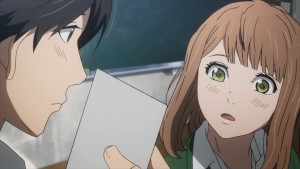 Here’s the thing, though – Hiroto is who he is. Even knowing everything he knows about his own future with Naho, he’d still want to do this if it meant saving Kakeru because that’s just the kind of guy he is. We’re looking at a massive circle of self-recrimination here – Kakeru blames himself for killing his mother, Hiroto and Naho blame themselves for killing Kakeru. They’re all wrong, but for the average person no amount of intellectual persuasion could ever get us to accept that emotionally. The heart wants what it wants and feels what it feels, and the brain can go fuck itself.
Here’s the thing, though – Hiroto is who he is. Even knowing everything he knows about his own future with Naho, he’d still want to do this if it meant saving Kakeru because that’s just the kind of guy he is. We’re looking at a massive circle of self-recrimination here – Kakeru blames himself for killing his mother, Hiroto and Naho blame themselves for killing Kakeru. They’re all wrong, but for the average person no amount of intellectual persuasion could ever get us to accept that emotionally. The heart wants what it wants and feels what it feels, and the brain can go fuck itself.
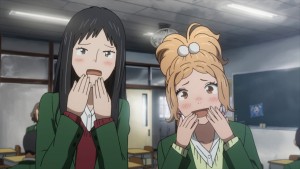 The New Year’s sequence was a tough one to take in emotionally. That day has a very strong pull for me – my memories of New Years in Japan are perhaps more vivid and distinct than any others, because it’s such a revered event in Japan and so emblematic of Japanese culture. The revelation that it was on New Year’s Eve that Hiroto confessed is a big one, especially given that it came right after a fight between Naho and Kakeru. That fight was really no one’s fault – how in the world could anyone blame Kakeru for being hyper-sensitive to health issues with his grandmother under his circumstances? And the emotional tug of the moment – New Year’s at the Shrine, in a moment he should be happily sharing with Naho, naturally brought out the guilt and introspection in Kakeru.
The New Year’s sequence was a tough one to take in emotionally. That day has a very strong pull for me – my memories of New Years in Japan are perhaps more vivid and distinct than any others, because it’s such a revered event in Japan and so emblematic of Japanese culture. The revelation that it was on New Year’s Eve that Hiroto confessed is a big one, especially given that it came right after a fight between Naho and Kakeru. That fight was really no one’s fault – how in the world could anyone blame Kakeru for being hyper-sensitive to health issues with his grandmother under his circumstances? And the emotional tug of the moment – New Year’s at the Shrine, in a moment he should be happily sharing with Naho, naturally brought out the guilt and introspection in Kakeru.
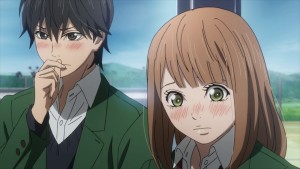 Should Suwa have confessed to Naho under those circumstances in the first place? Well, probably not – but neither he nor Naho knew what was really happening with Kakeru. It happened, and that’s all there is to it. The really painful thing is that even with all her foreknowledge and the events that have already been changed, Naho still can’t prevent the fight with Kakeru. And it reminds us of a very painful truth with Orange (and life) – in the end, you can’t save someone from their personal darkness unless they want to be saved. Only Kakeru can save Kakeru in the end, and as I feared, in the act of conspiring to save him his friends have made him feel even more isolated. Kakeru senses something is off here, and that he’s the only one not in on the secret. He’s an outsider, just as he was when he came to this beautiful little town. And that means he’s alone.
Should Suwa have confessed to Naho under those circumstances in the first place? Well, probably not – but neither he nor Naho knew what was really happening with Kakeru. It happened, and that’s all there is to it. The really painful thing is that even with all her foreknowledge and the events that have already been changed, Naho still can’t prevent the fight with Kakeru. And it reminds us of a very painful truth with Orange (and life) – in the end, you can’t save someone from their personal darkness unless they want to be saved. Only Kakeru can save Kakeru in the end, and as I feared, in the act of conspiring to save him his friends have made him feel even more isolated. Kakeru senses something is off here, and that he’s the only one not in on the secret. He’s an outsider, just as he was when he came to this beautiful little town. And that means he’s alone.
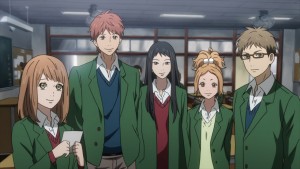 Ah, fate – why must you be so heartless? All of Kakeru’s friends only want to do what’s right, to save the kind and wounded boy they’ve come to love. As Hagita (who continues to emerge as a great character – his “I’m wearing a scarf too” was my favorite moment of the episode) points out, changing the future might not be such a great idea, because even if Kakeru is saved so many other things will change. That’s an interesting philosophical debate, and if you believe in the Parallel Worlds Theory I’d argue this is OK, because whatever future the kids create is the one that was meant to happen. But the real concern for Hagita – for all of them – is that they know what Hiroto will be giving up if they succeed. That’s not an abstraction, that’s a reality – and all of them have become aware of just what price Suwa is paying by working this scheme.
Ah, fate – why must you be so heartless? All of Kakeru’s friends only want to do what’s right, to save the kind and wounded boy they’ve come to love. As Hagita (who continues to emerge as a great character – his “I’m wearing a scarf too” was my favorite moment of the episode) points out, changing the future might not be such a great idea, because even if Kakeru is saved so many other things will change. That’s an interesting philosophical debate, and if you believe in the Parallel Worlds Theory I’d argue this is OK, because whatever future the kids create is the one that was meant to happen. But the real concern for Hagita – for all of them – is that they know what Hiroto will be giving up if they succeed. That’s not an abstraction, that’s a reality – and all of them have become aware of just what price Suwa is paying by working this scheme.
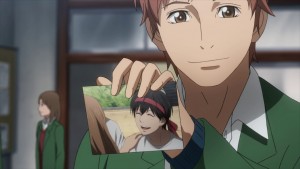 I did wonder, just for a moment, if Hiroto was going to repeat history when he showed up at the Jinja on New Year’s just before Midnight. But that wouldn’t have been the Suwa we know, the ultimate bro, the pillar. He’s the axis around which this group revolves, the one whose presence defines their meeting spot. Whatever happens, he’s going to try and do what’s right because his older self has made it impossible for him to happily follow the same course a second time. He knows too much, and that knowledge has already changed his future irrespective of what happens to Kakeru. Even in light of everything else that’s painful in Orange, that alone should make us a little sad.
I did wonder, just for a moment, if Hiroto was going to repeat history when he showed up at the Jinja on New Year’s just before Midnight. But that wouldn’t have been the Suwa we know, the ultimate bro, the pillar. He’s the axis around which this group revolves, the one whose presence defines their meeting spot. Whatever happens, he’s going to try and do what’s right because his older self has made it impossible for him to happily follow the same course a second time. He knows too much, and that knowledge has already changed his future irrespective of what happens to Kakeru. Even in light of everything else that’s painful in Orange, that alone should make us a little sad.


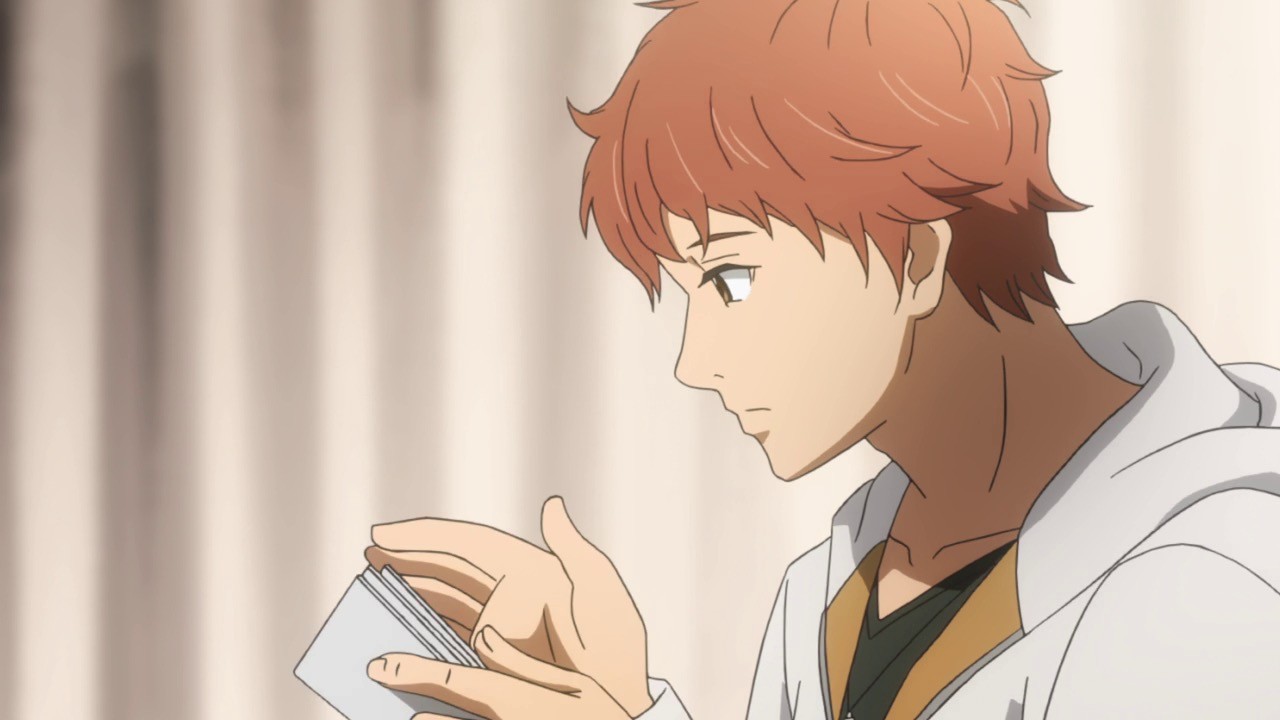
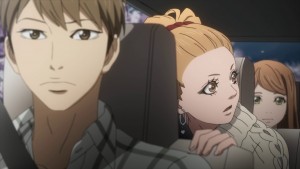
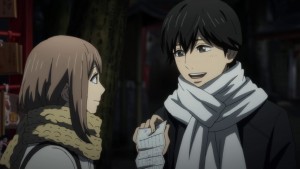
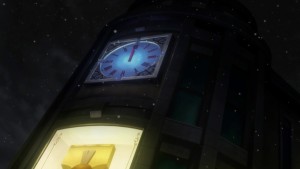
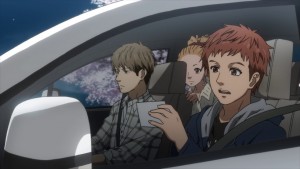
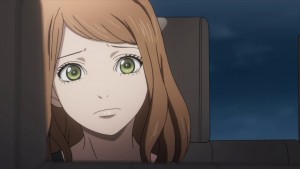
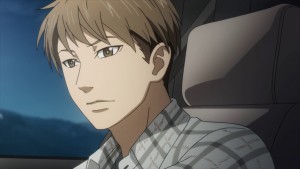
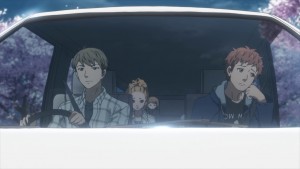
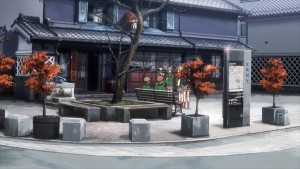
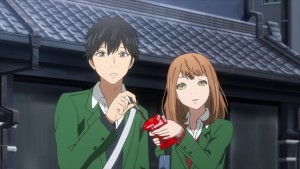
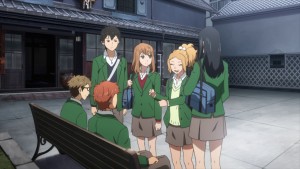
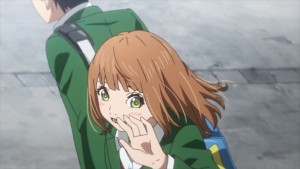
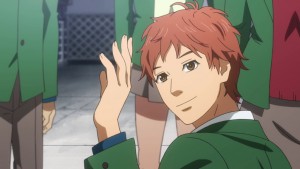
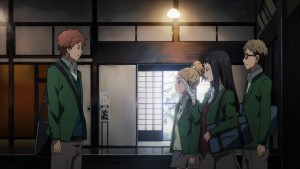
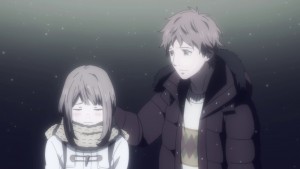
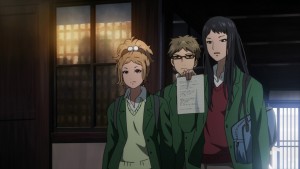
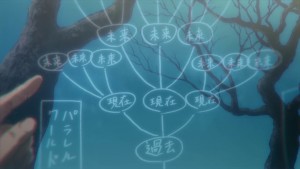
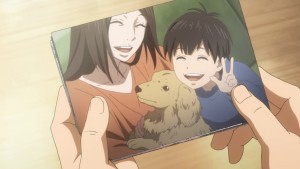
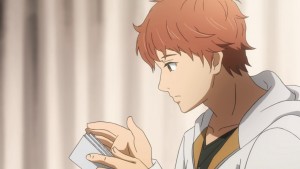

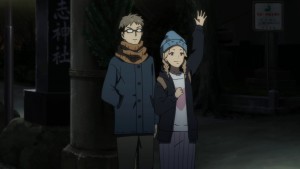
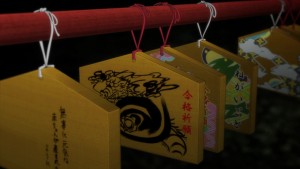
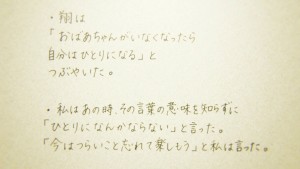
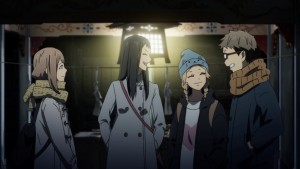
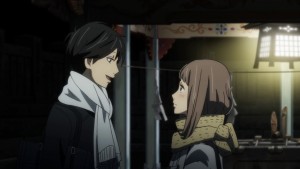
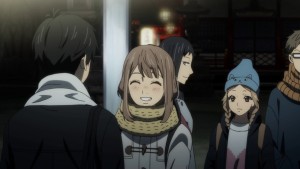
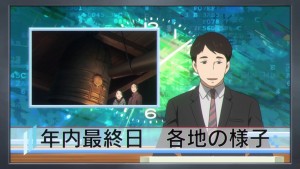
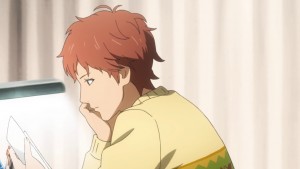
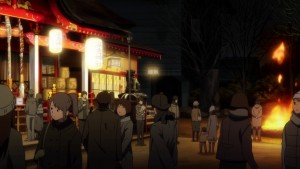
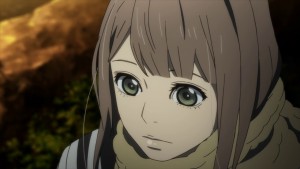
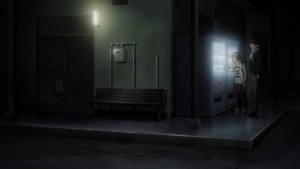
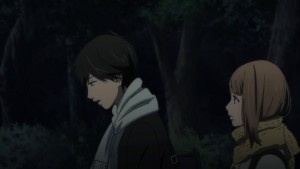
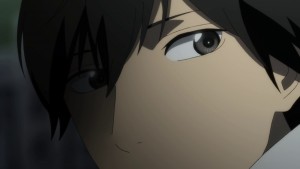
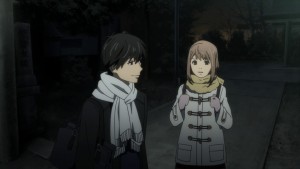
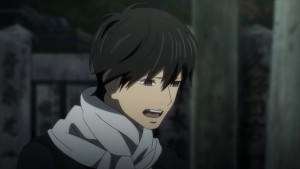
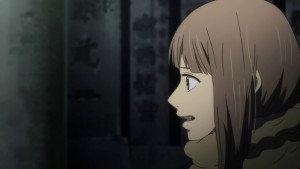
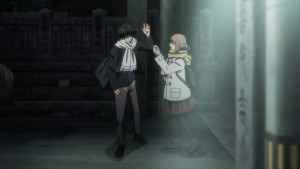
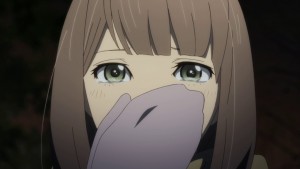
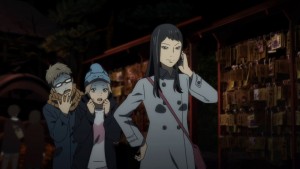
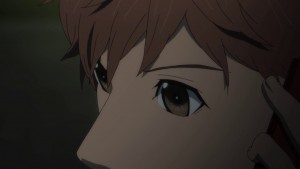
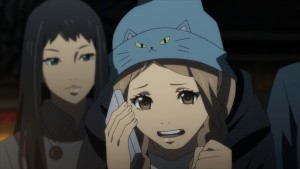
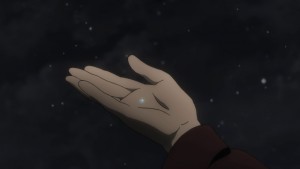
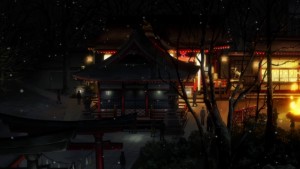
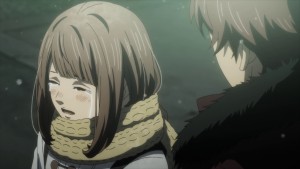
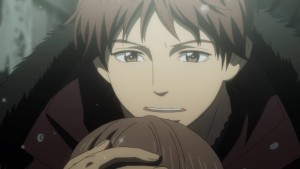
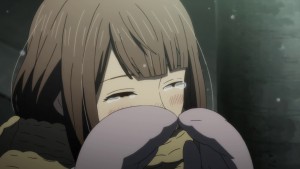
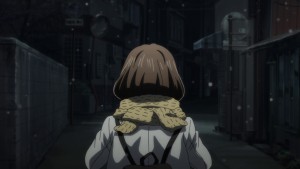
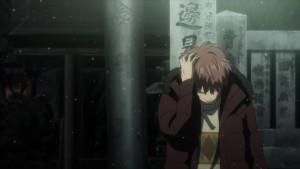
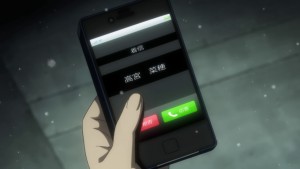
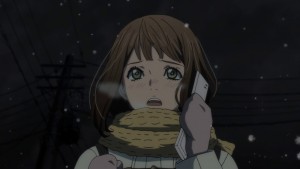
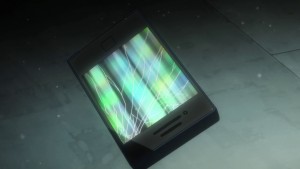

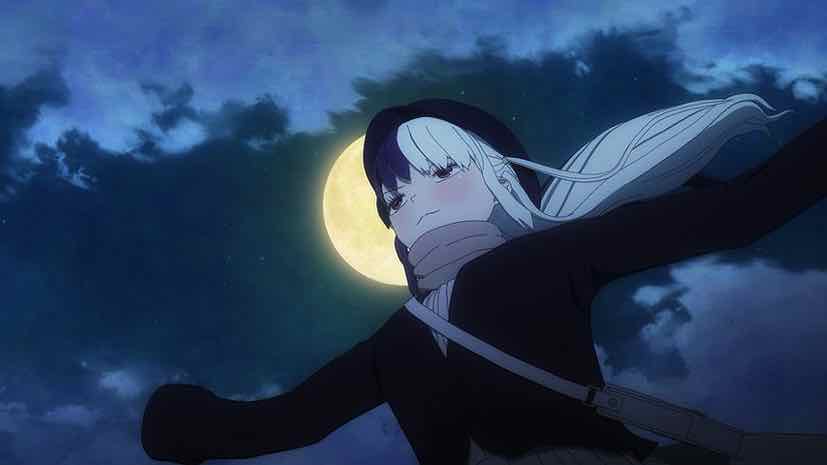
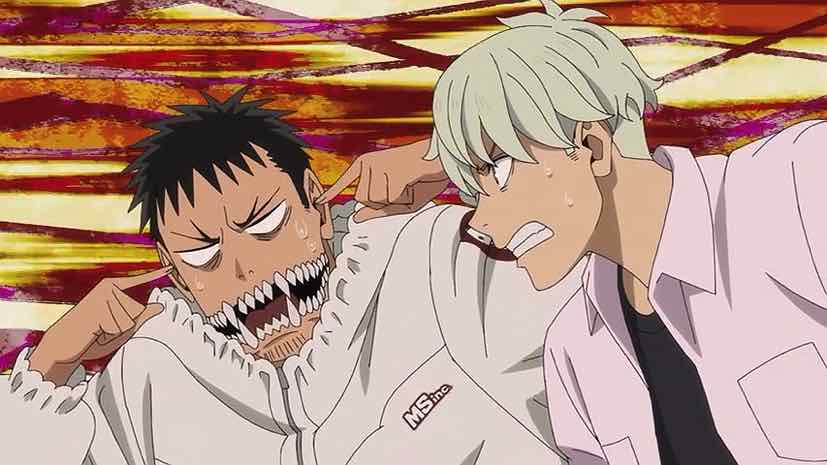
Zilla
September 11, 2016 at 2:48 pmYup, Suwa is my favorite character in this anime.
And since this isn’t touched on at all in the manga I can theorize, there is NO REASON that saving Kakeru, or even having Kakeru and Naho date during high school would preclude Suwa and Naho being together with a child ten years later. Certainly to Suwa it must feel like he is giving up that opportunity, and that just makes him a bigger “bro” for being willing to follow the letters advice. But, in life like in conveyor belt sushi, some plates end up in front of you more than once 😉
Simone
September 12, 2016 at 2:00 amI’m kind of annoyed at how this series talks about parallel worlds, then purposefully ignores the consequences of that by still making the letters an almost 100% reliable prediction of what’s going to happen. I mean, in the original world Kakeru died without knowing that Naho was in love with him. In this one, they are all but dating by now. Yet their conversations and the events leading to them are so identical that the same exact thing happens on New Year’s Eve? Eh.
Besides that, Naho’s answer to Kakeru was frankly insensitive, considering what happened last time. “She’s going to be fine” are pretty empty words indeed. Why not take it slow and let him do what he feels is more comfortable? Why not just asking to accompany him, or promise he’ll call her and they can pass the midnight together while talking? “I have a letter from the future that says your grandma is fine” isn’t a very compelling argument (also, again, butterfly effect, for all they know in this world the granny WON’T be fine).
Guardian Enzo
September 12, 2016 at 8:04 amHere’s my take on that.
As for the first point, I think that’s 100% intentional. i.e., it isn’t as easy to change the future as you think when people are involved. People tend to follow their own tendencies, irrespective of outside meddling, and – corny as it is – “change comes from within”. If people don’t want to be saved, it’s hard to save them.
On the second – yes, I agree, Naho’s response there was a bit of a flub. I also think the others should never have sent the two of them off along together, knowing what they knew. But again I buy it, because these are kids, and kids without a lot of experience in relationships who (presumably) know next to nothing about psychology. My initial read was exactly the same – she should have insisted she accompany him to visit his Grandma. But I’m not sure that would have been realistic for Naho’s character. I think in anime we tend to get teens who are either comically stupid (in comedies) or unrealistically precocious. Ones like this – basically smart but clueless and full of bad judgment that drives you crazy – might be more realistic.
Simone
September 12, 2016 at 9:15 am> As for the first point, I think that’s 100% intentional. i.e., it isn’t as easy to change the future as you think when people are involved. People tend to follow their own tendencies, irrespective of outside meddling, and – corny as it is – “change comes from within”. If people don’t want to be saved, it’s hard to save them.
Yes, but that’s more of a general sense thing. Like, I’d expect to behave roughly the same when put in similar situations, but not the details of the events to stubbornly stay exactly identical. For example, Kakeru and Naho being on such different terms should necessarily lead to them for example talking on a different level of openness. Being more/less used to someone else, having spent more/less time with them, makes a huge difference in how we talk to each other. For example in the original timeline he could have interpreted Naho’s request as personally frustrating because he didn’t realise she was in love with him and so staying in her company would only rub salt into his wound, whereas here there’s no reason to think that. This could make things better or worse (he could conclude that Naho’s love is really egotistical since she wouldn’t understand his feelings, only think about her desire to stay with him), but it ought to make them *different* somehow.
To me it seems that the problem with this series is in writing. On one hand, the original conceit, the letter, is being followed pedantically, and that results in huge actions having minuscule consequences in the story. I’d almost think this was adapted from a VN if I didn’t know better because not branching the narrative too much is obviously a pressing concern in video games and this seems to do just that: keep the core plot always the same no matter what choices are made. On the other, since perfect predictability should admittedly lead to a pretty straightforward resolution (at least as far as getting Kakeru to survive beyond the 15th February goes – then it’s uncharted territory again), more drama is needed and introduced from the backdoor through contrivances like Naho never reading too far ahead, Naho not asking her friends for help even when they’ve discussed the matter, Naho saying something stupid at the worst time… mostly Naho, yeah. I mean, I get the idea that a character can be flawed, but at this point it looks like the perfect opposite of a character who gets everything right – she’s like a plot convenience for creating more drama. This would have been more believable imho if the author let the story stray out further away from the letter’s and then introduced the conflict created by the characters needing to find their way again without good knowledge of the future. In that situation, huge, blunt mistakes like this one would have had more weight and would have felt more understandable. But that would have removed the dramatic device of the hard deadline on February the 15th, replacing it with a more vague “well, he still might commit suicide at some point in the future”.
sarasva
September 12, 2016 at 8:13 amThe fact that Enzo wrote such an emotionally charged review is a testament to how powerful and heartbreaking Orange is. I mean, damn. Asking fate why it’s so cruel? “My ass?” Writing in all CAPS?
But that’s okay. I would too.
Because SUWAAAAA!!!! You kind, selfless boy, you! SUWAAAA!!!
On an unrelated note, I hope the animation quality will not drop again for the final two episodes. My eyes need not cry extra tears…